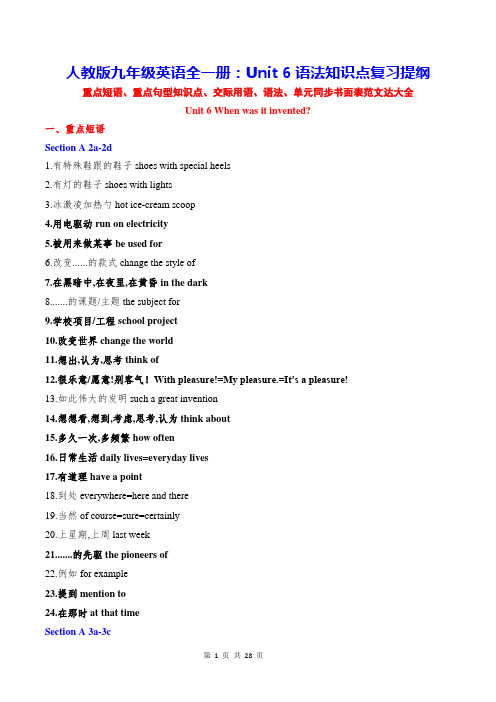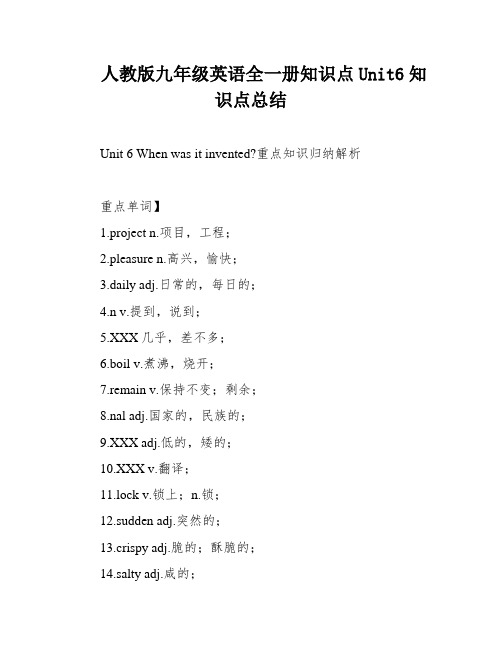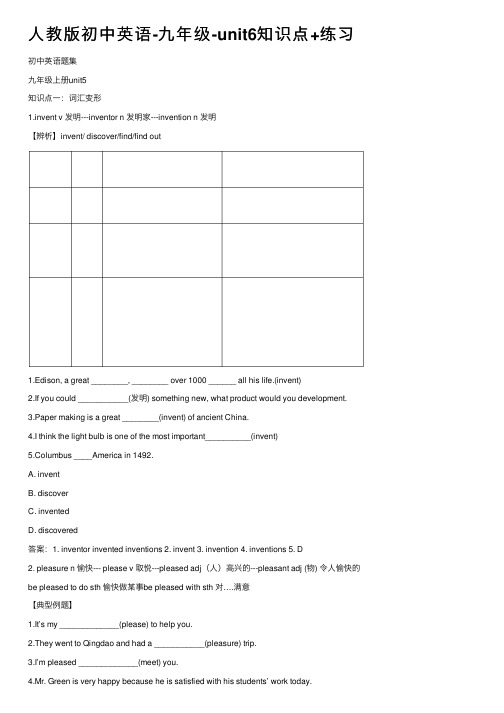人教版九年级英语Unit6知识点精讲及练习题资料讲解
人教版九年级英语全一册:Unit 6 语法知识点复习提纲(含单元测试卷及答案全套)

147.fall over被...绊倒
148.fall off跌落;从...掉下来
二、重点句型知识点
Section A
标题句型1.Whenwas it invented?它什么时候发明的?
一般过去时被动语态:主语+was/were+v-过去分词
48.发生take place
49.将茶的知名度传播到.....spread the popularity of tea to...
50.世界各地,全世界all over the world=around the world
51.虽然,即使even though/if
52.了解know about
53.毫无疑问without doubt(在肯定句中,其后接whether从句,在否定句和疑问句中,接that从句)
41.带到,带来bring to
42.在英格兰,在英国in England
43.茶树tea plants
44.最好的茶叶the finest tea leaves
45.不到,少于less than
46.国饮,全国性的饮料national drink
47.从中国到西方国家from China to Western countries
138.流行的in style
139.过时的out of style
140.中国少年先锋队the Young Pioneers
141.国宝national treasure
142.犯错,犯错误make mistakes
143.奥林匹克运动会the Olympics
Unit6知识点归纳(短语+句型+语法) 人教版九年级英语全册

人教版九年级U6知识点归纳(短语+句型+语法)Unit 6 When was it invented?【重点短语】1. by accident 偶然地;意外地2. without doubt 毫无疑问的;的确3. by mistake 错误地;无意中4. look up to 钦佩;仰慕5. take place 发生;出现6. all of a sudden 突然;猛地7. divide…into… 把……分开8. the Olympics 奥林匹克运动会9. the style of ……的样式10. be used for 被用于……11. give sth. to sb./ give sb. sth. 给某人某样东西12. be used for doing ,用来做…...14. all day 整天15. by mistake 错误地16. make mistake犯错17. by accident 意外,偶然19. not…until… 直到……才……20. fall into 落入,掉进21. fall down 摔倒22. in the way 这样23. travel around 周游24. knock into 撞上. 某人)25. divide sth. into … ,将…划分成,【重点句型】1.Who was it invented by? It was invented by Bell.2. What is the hot ice-cream scoopused for? It s used for serving really cold ice-cream.3. English is spoken by many people.4. I gave a pen to him.= I gave him a pen. 我给了他一支笔。
5. It made me happy. 它使我高兴6. I didn’t go to bed until I finished my work. 我直到完成我的工作才去睡觉。
人教版九年级英语Unit6精编讲义

人教版九年级英语Unit6精编讲义Unit6When was it invented?讲义一、词性转换Section A1.electricity→(adj.)electric2.pleasure→(adj.)pleased3.accidental→(n.)accident4.ruler→(v.)rule5.boil→(adj.)boiling/boiled6.national→(n.)nation7.low→(反义词.)high8.translate→(n.)translation9.sudden→(adv.)suddenly10.musical→(n.)music二、短语归纳1.the style of……的样式2.such a great invention如此伟大的一项发明3.be used for被用于…4.by accident偶然;意外地5.think of/about想;考虑6.fall into落入;陷入7.some time一段时间8.less than少于;不到9.take place发生;出现10.the popularity of……的普及11.without doubt毫无疑问12.at a low price以低价13.translate…into…把…翻译成…14.all of a sudden突然;猛地15.by mistake错误地;无意中16.in the end最后三、句型集萃1.It is said that+从句据说…2.It is believed that+从句人们认为…3.ask sb.(not)to do sth.要求某人(不要)做某事11.instrument→(n.)instrumental Section B12.salty→(n.)salt13.Canadian→(n.)Canada14.divide→(n.)division15.popularity→(adj.)popular16.hero→(adj.)heroic17.professional→(n.)profession17.a cook called George Crum一个名字叫乔治克拉姆的厨师18.more than多于;超过19.divide…into…把…分成…20.at the same time同时21.stop…from doing…阻止…做…22.dream of/about梦想;向往23.not only…but also…不但…而且…24.the number of……的数量25.more and more越来越26.look up to钦佩;仰慕27.achieve one’s dreams实现某人的梦想28.take notes记笔记29.be used to do sth.被用于做某事30.lead to导致;导向4.teach sb.to do sth.教某人做某事5.need to do sth.需要做某事6.encourage sb.to do鼓励某人做某事s三、重点句子1. the style of the shoes 鞋的样式★style 短语:in style 流行的;时髦的 out of style 过时的a life style 生活方式2. --- Can you help me think of an invention? 你能帮我想个发明吗?★★--- My pleasure! 乐意效劳!辨析:pleasure, pleased, pleasing, please 与 pleasantpleasure ,名词,“愉快,高兴”,多用于口语:It ’s my pleasure./ With pleasure. pleased ,形容词,“高兴的,喜欢的”,修饰人;pleasing ,形容词,“令人愉快的,讨人喜欢的;使人满意的,合意的” 修饰物; please ,及物动词,“使高兴、满意、愉快”等;不及物动词,“高兴,愉快”等; pleasant ,形容词,定语,“令人高兴的,令人愉快的”,修饰事物,不能修饰人。
新人教版九年级英语UNIT6知识点讲义

新人教版九年级英语UNIT6知识点讲义在九年级英语学习中,UNIT6是一个重要的单元,涵盖了许多重要的知识点。
本文将对新人教版九年级英语UNIT6的知识点进行详细的讲解,希望对同学们的学习有所帮助。
一、重点单词1. connect(v.)-连接例句:We need to connect the two wires to have electricity.词组:connect with与...连接2. educate(v.)-教育例句:Parents have the responsibility to educate their children.词组:receive an education接受教育3. remove(v.)-移除例句:Please remove your shoes before entering the house.词组:remove from...从...中移除4. influence(n.)-影响例句:His speech had a great influence on the audience.词组:have an influence on对...有影响5. generation(n.)-一代人例句:Each generation brings something new to the world.词组:the older generation年纪较大的一代人6. worldwide(adj.)-全球的例句:The internet has made communication worldwide much easier.词组:all over the world全球各地二、重点短语1. take up开始从事例句:She decided to take up painting after retirement.2. set up建立例句:He set up his own company after years of hard work.3. make progress取得进步例句:With hard work, she made great progress in her English studies.4. look up查寻例句:If you don't know the meaning of a word, you can look it up in the dictionary.5. break down(机器等)出故障例句:The car broke down on the way to the airport.6. be addicted to对...上瘾例句:He is addicted to playing video games and spends too much time on them.三、重点语法1. 定语从句定语从句是指在句子中修饰名词或代词的从句。
人教版九年级英语Unit6知识点精讲及练习题教学总结

新目标九年级Unit 61. heel _____________ 11. 风格____________ 21. 剩余__________2. scoop_____________ 12. 项目,工程_________ 22. 贸易__________3. electricity__________ 13. 愉快(n.)__________ 23. 疑问__________4. zipper _____________ 14. 每日的___________ 24. 冰箱__________5. accidental _________ 15. 网站_____________ 25. 翻译__________6. saint _____________ 16. 先锋____________ 26. 锁上__________7. crispy _____________ 17. 名单____________ 27. 地震__________8. salty ____________ 18. 提到_____________28. 饼干__________9. popularity __________ 19. 差不多__________ 29. 仪器__________10. professional _______ 20. 煮沸_____________ 30. 英雄__________二、重点短语1. have a point _________________ 6. 发生________________2. by accident __________________ 7. 毫无疑问_______________3. all of a sudden ________________ 8. 错误地________________4. divide into __________________ 9. 不但……而且……_____________5. look up to _______________ 10. 把……译成……_____________三、重点句子1.Did you know that tea, the most popular drink in the world after water, was invented by accident?2.It is said that a chinese ruler called shennong was the first to discover tea as a drink.3.One day, shennong was boiling drinking water over an open fire. Some leaves from a tea plant fell into the water and remained there for some time.4.It is believed that tea was brought to Korea and Japan during the 6th and 7th centuries.5.In England, tea didn’t appear until around 1660, but in less than 100 years, in had become the national drink.6.The tea trade from china to western countries took place in the 19th century. This helped to spread the popularity of tea and the tea plant to more places around the world.7.Even though many people now know about tea culture, the chinese are without doubt the ones who best understand the nature of tea.8.Basketball is a much-loved and active sport that is enjoyed by many for fun and exercise.9.When he was a college teacher, he was asked to think of a game that could be played in the winter.10He divided the men in his class into two teams and taught them to play his new game. Players on the same team must work together to get the ball in the other team’s basket. At the same time, they need to stop the competing team from getting the ball into their own basket.11.Today, the popularity of basketball has risen around the world, with many young people dreaming of becoming famous payers.12.Basketball has not only become a popular sport to play, but it has also become a popular sport to watch.13.The number of foreign players, including chinese players, in the NBA has increased. These stars encourage young people to work hard to achieve their dreams.四、 跟踪训练:1. ---When ______ the telephone _______(invent)?---I think it __________(invent) in 1876.2. ---What is the hot ice-cream scoop _______(use) for?---It ’s ______(use) for serving really cold ice-cream.3. It ____(据说) that a Chinese ruler called Shen Nong was the first to discover tea as a drink.(鼓励)young people _______(work) hard to achieve their dreams. was/were + 及物动词过去分词如:The zipper was invented in 1893.2.辨析pleasure, pleasant 和pleased(1) pleasure, 名词,意为“高兴,愉快”,常见用法:It ’s a pleasure. / My pleasure. / Withpleasure. 不用谢,别客气。
人教版九年级英语全一册知识点Unit6知识点总结

人教版九年级英语全一册知识点Unit6知识点总结Unit 6 When was it invented?重点知识归纳解析重点单词】1.project n.项目,工程;2.pleasure n.高兴,愉快;3.daily adj.日常的,每日的;4.n v.提到,说到;5.XXX几乎,差不多;6.boil v.煮沸,烧开;7.remain v.保持不变;剩余;8.nal adj.国家的,民族的;9.XXX adj.低的,矮的;10.XXX v.翻译;11.lock v.锁上;n.锁;12.sudden adj.突然的;13.crispy adj.脆的;酥脆的;14.salty adj.咸的;15.sour adj.酸的,有酸味的;16.customer n.顾客;17.Canadian adj.加拿大的;18.divide v.分开,分散;19.heron n.英雄,男主角;20.nal adj.职业的,专业的;重点词组】1.shoes with special heels 特殊后跟的鞋子2.hot ice cream scoop 热的冰其淋勺子3.run on electricity 电动的4.be used for 被用作5.the subject for my school project 学校项目的课题6.our daily lives 我们的日常生活7.have a point 有点道理8.XXX 偶然,意外地9.over the open fire 在火堆上10.fall into the water 落入水中11.take place 发生12.without doubt 毫无疑问13.at a low price 以一个很低的价格14.XXX the book into different languages 把书翻译成不同种的语言15.all of a sudden 突然16.by XXX 错误地17.a much-loved and active sport 一个深受喜爱并且积极的运动18.divide…into 把…分开19.sb from doing sth 阻止某人做某事20.look up to 钦佩,仰慕21.XXX XXX22.Borrowing someone else's idea1.In my n。
人教版初中英语-九年级-unit6知识点+练习

⼈教版初中英语-九年级-unit6知识点+练习初中英语题集九年级上册unit5知识点⼀:词汇变形1.invent v 发明---inventor n 发明家---invention n 发明【辨析】invent/ discover/find/find out1.Edison, a great ________, ________ over 1000 ______ all his life.(invent)2.If you could ___________(发明) something new, what product would you development.3.Paper making is a great ________(invent) of ancient China.4.I think the light bulb is one of the most important__________(invent)5.Columbus ____America in 1492.A. inventB. discoverC. inventedD. discovered答案:1. inventor invented inventions 2. invent 3. invention 4. inventions 5. D2. pleasure n 愉快--- please v 取悦---pleased adj(⼈)⾼兴的---pleasant adj (物) 令⼈愉快的be pleased to do sth 愉快做某事be pleased with sth 对….满意【典型例题】1.It’s my _____________(please) to help you.2.They went to Qingdao and had a ___________(pleasure) trip.3.I’m pleased _____________(meet) you.4.Mr. Green is very happy because he is satisfied with his students’ work today.A. is moved byB. is good forC. is fond ofD. is pleased with5. —Thank you for supporting the volunteer project.—________. Many hands make light work.A. My pleasureB. All rightC. Never mindD. That’s right 答案:1.pleasure 2. pleasant 3. to meet 4. D 5. A3. salty adj.咸的salt n “盐;⾷盐”→salty adj. 咸的【拓展】n +y = adj. Sun→ sunny cloud→ cloudy wind→ windy rain → rainy snow → snowy n+ ful = adj. u se →useful help→ helpful care → careful thankful感激的forgetful健忘的n + ly =adj. friend →friendly love→ lovely【典型例题】1.French fries taste_______(salt).2.I sprinkled lots of _______on them so they were really ______(salt)3.It's a____ day, isn't it? Let's do something special. (sun)4.She likes _______ cookies. They are hard dry and easily broken.A. saltyB. sweetC. sourD. crispy5.I want a sweet milk. Put some ______ in my cup, please.A. iceB. soupC. saltD. sugar答案:1.salty 2.salt , salty 3. sunny 4. D 5. D4. smell (1) n ⽓味a terrible smell 【记】small (⼩的) → smell(2) v → smelt →smelt +adj.闻起来smell terrible【典型例题】1.— How do you like the fish I cooked for you?—I haven’t had it yet. However, it ____ good.A. smellsB. tastesC. soundsD. feels2.Mum, what are you cooking? It ______ so sweet.A. tastesB. feelsC. soundsD. smells3.The bread smells _________ and it sells ________.A. well; goodB. good; goodC. good; wellD. well; well4.Mom is cooking dinner. It ______ so nice.A. smellsB. tastesC. feelsD. sounds答案:1.B 2.D 3. B 4. A5. accident n 事故--- adj accidental 意外的,偶然的by accident 偶然,意外地event & incident & accidentevent 通常指具有很⼤影响⼒的国内的、国际的或历史上的事件,也可以指运动会的⽐赛项⽬。
Unit6词汇精讲人教版英语九年级全册

九年级全一册英语同步复习 Unit 6 When was it invented?
1. 语法:一般过去式的被动语态;
2. 掌握单词表单词的汉意,拼写及相关词组;
3. 掌握并熟练运用重点单词的用法搭配;
英文 词性 中文 用法搭配 heel n. 鞋跟;足跟 scoop n. 勺;铲子
electricity
n.
电;电能
[助记]:
adj. 电的;用电的;电动的; electric
style n. 样式;款式 [词组]:
……的样式__________________________;
流行 :in style ; 过时:out of style ;
project n. 项目;工程
pleasure
un.
高兴;愉快
[词组]:
1. with pleasure! 乐意效劳!(表示乐于接受或同意某事);
2. My pleasure. (A pleasure ) 不客气。
(回答别人的感谢);
cn. 快乐的事 It’s a pleasure to meet you.
[助记]: pleased ______________ adj.
please (interj. /v.) pleasant______________
n. pleasure ______________
______________
[边学边练]
学习目标
夯基固本·厚积薄发 词 汇 学 习。
- 1、下载文档前请自行甄别文档内容的完整性,平台不提供额外的编辑、内容补充、找答案等附加服务。
- 2、"仅部分预览"的文档,不可在线预览部分如存在完整性等问题,可反馈申请退款(可完整预览的文档不适用该条件!)。
- 3、如文档侵犯您的权益,请联系客服反馈,我们会尽快为您处理(人工客服工作时间:9:00-18:30)。
新目标九年级Unit 61. heel _____________ 11. 风格____________ 21. 剩余__________2. scoop_____________ 12. 项目,工程_________ 22. 贸易__________3. electricity__________ 13. 愉快(n.)__________ 23. 疑问__________4. zipper _____________ 14. 每日的___________ 24. 冰箱__________5. accidental _________ 15. 网站_____________ 25. 翻译__________6. saint _____________ 16. 先锋____________ 26. 锁上__________7. crispy _____________ 17. 名单____________ 27. 地震__________8. salty ____________ 18. 提到_____________28. 饼干__________9. popularity __________ 19. 差不多__________ 29. 仪器__________10. professional _______ 20. 煮沸_____________ 30. 英雄__________二、重点短语1. have a point _________________ 6. 发生________________2. by accident __________________ 7. 毫无疑问_______________3. all of a sudden ________________ 8. 错误地________________4. divide into __________________ 9. 不但……而且……_____________5. look up to _______________ 10. 把……译成……_____________三、重点句子1.Did you know that tea, the most popular drink in the world after water, was invented by accident?2.It is said that a chinese ruler called shennong was the first to discover tea as a drink.3.One day, shennong was boiling drinking water over an open fire. Some leaves from a tea plant fell into the water and remained there for some time.4.It is believed that tea was brought to Korea and Japan during the 6th and 7th centuries.5.In England, tea didn’t appear until around 1660, but in less than 100 years, in had become the national drink.6.The tea trade from china to western countries took place in the 19th century. This helped to spread the popularity of tea and the tea plant to more places around the world.7.Even though many people now know about tea culture, the chinese are without doubt the ones who best understand the nature of tea.8.Basketball is a much-loved and active sport that is enjoyed by many for fun and exercise.9.When he was a college teacher, he was asked to think of a game that could be played in the winter.10He divided the men in his class into two teams and taught them to play his new game. Players on the same team must work together to get the ball in the other team’s basket. At the same time, they need to stop the competing team from getting the ball into their own basket.11.Today, the popularity of basketball has risen around the world, with many young people dreaming of becoming famous payers.12.Basketball has not only become a popular sport to play, but it has also become a popular sport to watch.13.The number of foreign players, including chinese players, in the NBA has increased. These stars encourage young people to work hard to achieve their dreams.四、 跟踪训练:1. ---When ______ the telephone _______(invent)?---I think it __________(invent) in 1876.2. ---What is the hot ice-cream scoop _______(use) for?---It ’s ______(use) for serving really cold ice-cream.3. It ____(据说) that a Chinese ruler called Shen Nong was the first to discover tea as a drink.(鼓励)young people _______(work) hard to achieve their dreams. was/were + 及物动词过去分词如:The zipper was invented in 1893.2.辨析pleasure, pleasant 和pleased(1) pleasure, 名词,意为“高兴,愉快”,常见用法:It ’s a pleasure. / My pleasure. / With pleasure. 不用谢,别客气。
(2) pleasant, 形容词,意为“令人愉快的,舒适的”,常用来修饰事物。
(3) pleased, 形容词,意为“感到高兴的,满意的”,主语为人,常用:be pleased with, be pleased to do sth.3. It is said that … 是一个常见句式,表示“据说……”, that 后是完整句子,it 作形式主语,真正的主语是that 引导的从句。
类似的句式还有:It is believed that…, It ’s reported that …, It ’s well-known that …等。
4. by mistake 意为“错误地,无意中”, mistake 要用单数,且无冠词。
by accident 意为“意外地”。
5. not only …but also 意为“不仅……而且……”当连接两个并列分句时,not only 可以放在句首表示强调,其后的分句要用部分倒装结构。
如Not only is she clever, but also she is beautiful. 当连接两个主语时,谓语动词的数应该和临近的主语保持一致,称为“就近原则”。
如:Not only Tom but also I am fond of watching TV .6. the number of 和 a number of 的区别:the number of 意为“……的数量”, 而a number of 表示“许多”。
例如:There are a number of students in our class, and the number of them is 45. 我们班有很多学生,其数目是45.7. stop … from doing sth. 阻止……做某事。
例如:They need to stop the competing team from getting the ball into their own basket.8. divide …into … 把……分成……,例如:Dr. Naismith divided the men in his class into two teams and taught them to play his new game.9. achieve one ’s dream 实现梦想,one ’s dream comes true 梦想实现。
例如:They are trying their best to achieve their dream. I think their dreams will come true one day.10. find it +adj. + that 从句,意为“发现某事是……”。
如:He found it interesting that so many products in the local shops were made in China. 另外,find it + adj. + to do sth. “发现。
